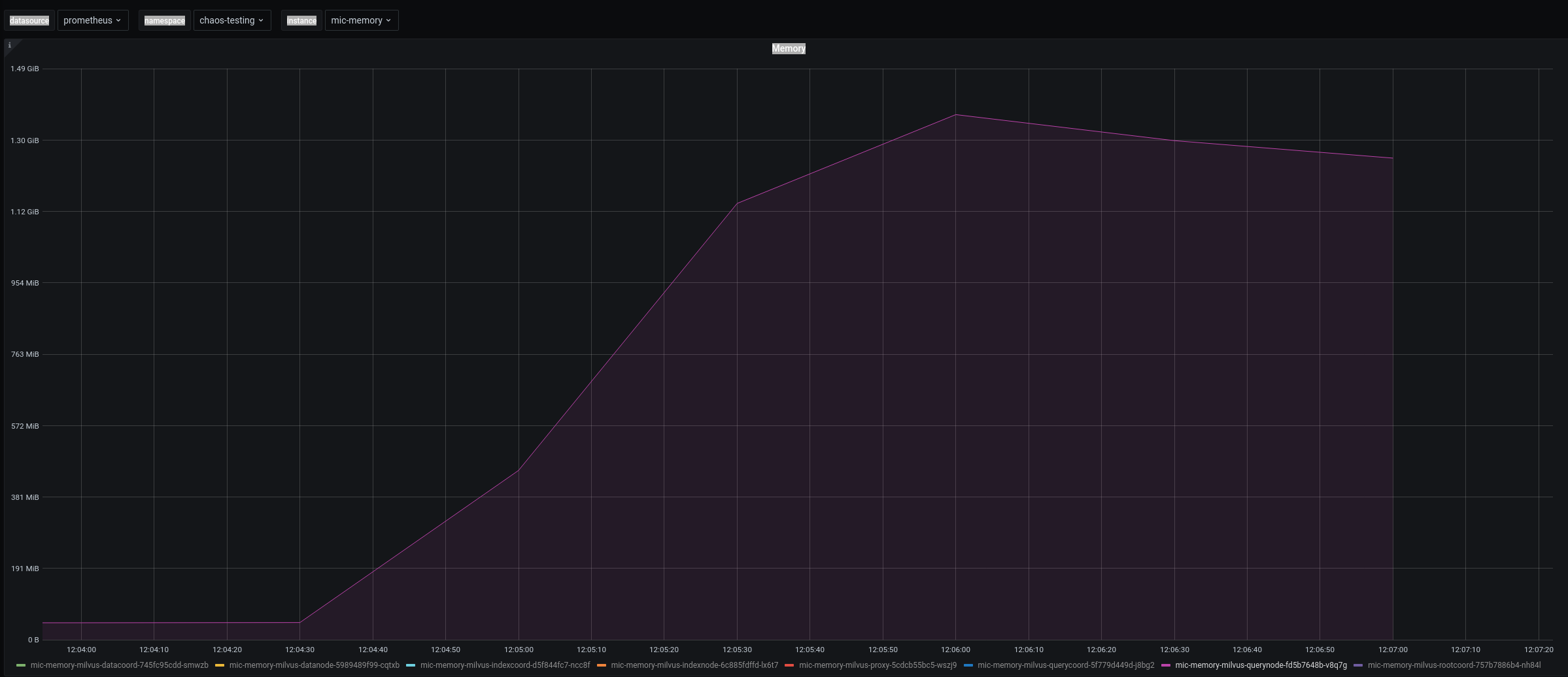milvus: [Bug]: [Memory]Release and load collection get exception no queryNode to allocate
Is there an existing issue for this?
- I have searched the existing issues
Environment
- Milvus version: master-20211123-73f18c5
- Deployment mode(standalone or cluster): cluster
- SDK version(e.g. pymilvus v2.0.0rc2): pymilvus 2.0.0rc9.dev11
- OS(Ubuntu or CentOS):
- CPU/Memory: limit querynode memory 2Gi
- GPU:
- Others:
Current Behavior
- deploy milvus cluster master-20211123-73f18c5 and limit querynode memory 2Gi
- load collection (dim=512, num_entities=399360 about 780Mi)
- search successfully
- release collection (No exception, but the memory usage of querynode did not drop)
- re-load failed
[2021-11-23 04:13:43,651 - INFO - ci_test]: ################################################################################ (conftest.py:162)
[2021-11-23 04:13:43,651 - INFO - ci_test]: [initialize_milvus] Log cleaned up, start testing... (conftest.py:163)
[2021-11-23 04:13:44,673 - DEBUG - ci_test]: {
auto_id: False
description:
fields: [{
name: int64
description:
type: 5
is_primary: True
auto_id: False
}, {
name: float
description:
type: 10
}, {
name: float_vector
description:
type: 101
params: {'dim': 512}
}]
}
(test_chaos_memory_stress.py:63)
[2021-11-23 04:13:44,673 - DEBUG - ci_test]: 2 (test_chaos_memory_stress.py:64)
[2021-11-23 04:13:48,047 - ERROR - ci_test]: Traceback (most recent call last):
File "/root/milvus/tests/python_client/utils/api_request.py", line 18, in inner_wrapper
res = func(*args, **kwargs)
File "/root/milvus/tests/python_client/utils/api_request.py", line 45, in api_request
return func(*arg, **kwargs)
File "/usr/local/lib/python3.6/site-packages/pymilvus/orm/collection.py", line 449, in load
conn.load_collection(self._name, timeout=timeout, **kwargs)
File "/usr/local/lib/python3.6/site-packages/pymilvus/client/stub.py", line 58, in handler
raise e
File "/usr/local/lib/python3.6/site-packages/pymilvus/client/stub.py", line 42, in handler
return func(self, *args, **kwargs)
File "/usr/local/lib/python3.6/site-packages/pymilvus/client/stub.py", line 322, in load_collection
return handler.load_collection("", collection_name=collection_name, timeout=timeout, **kwargs)
File "/usr/local/lib/python3.6/site-packages/pymilvus/client/grpc_handler.py", line 75, in handler
raise e
File "/usr/local/lib/python3.6/site-packages/pymilvus/client/grpc_handler.py", line 67, in handler
return func(self, *args, **kwargs)
File "/usr/local/lib/python3.6/site-packages/pymilvus/client/grpc_handler.py", line 820, in load_collection
raise BaseException(response.error_code, response.reason)
pymilvus.client.exceptions.BaseException: <BaseException: (code=1, message=call query coordinator LoadCollection: rpc error: code = Unknown desc = , no queryNode to allocate)>
(api_request.py:26)
[2021-11-23 04:13:48,047 - ERROR - ci_test]: (api_response) : <BaseException: (code=1, message=call query coordinator LoadCollection: rpc error: code = Unknown desc = , no queryNode to allocate)> (api_request.py:27)
Server log: milvus_logs.tar.gz
Memory usage:

Expected Behavior
No response
Steps To Reproduce
No response
Anything else?
No response
About this issue
- Original URL
- State: closed
- Created 3 years ago
- Comments: 18 (18 by maintainers)
This issue exposed many problems.
I will open two more issues to solve 2 and 3 issues. Problem 1 mentioned in this issue can be closed now.
Experiment codes: